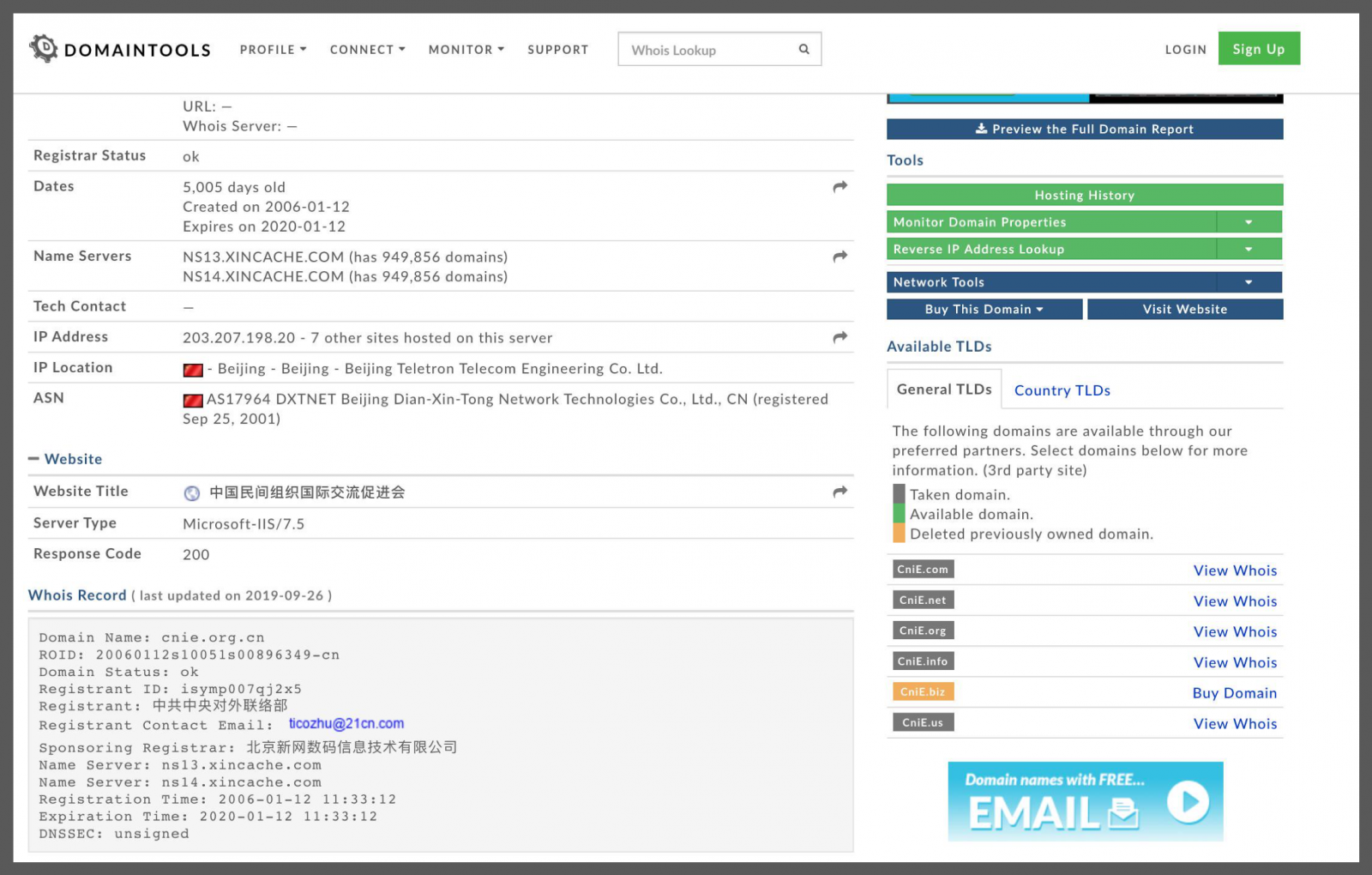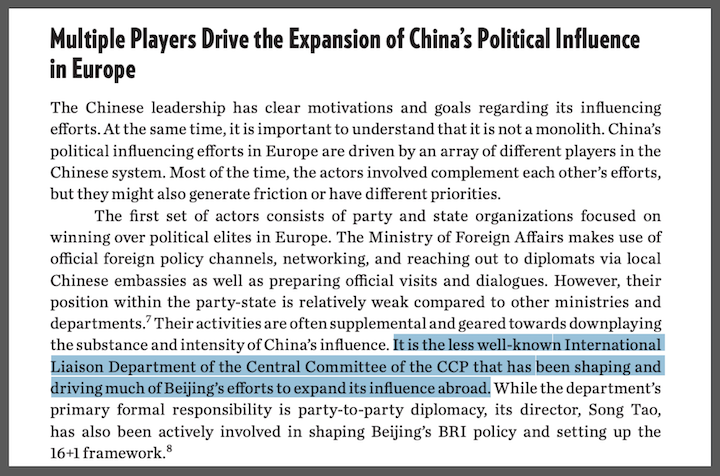
Image by Turbo Beagle posted to Flickr.com under CC license.
Untangling People-to-People Ties
In the second installment of our ongoing series offering real examples of how experts can assess Chinese parties and partnerships with basic due diligence, we look more closely at a new initiative between China and Romania.
Earlier this month at Echowall, we looked at how official news stories from Chinese state media on exchanges between China and Europe can, if subjected to basic scrutiny, reveal basic facts about the tools and tactics of China's engagement at various levels – affording a level of transparency to connections that are often astonishingly opaque.
This week, using slightly different tools and techniques – none requiring complicated work or specialized knowledge of China – we look at the launch of a new "Silk Road Community Building Initiative" in Romania, which has recently (like other former Soviet satellite states) been celebrating the 70th anniversary of relations with the People's Republic of China.
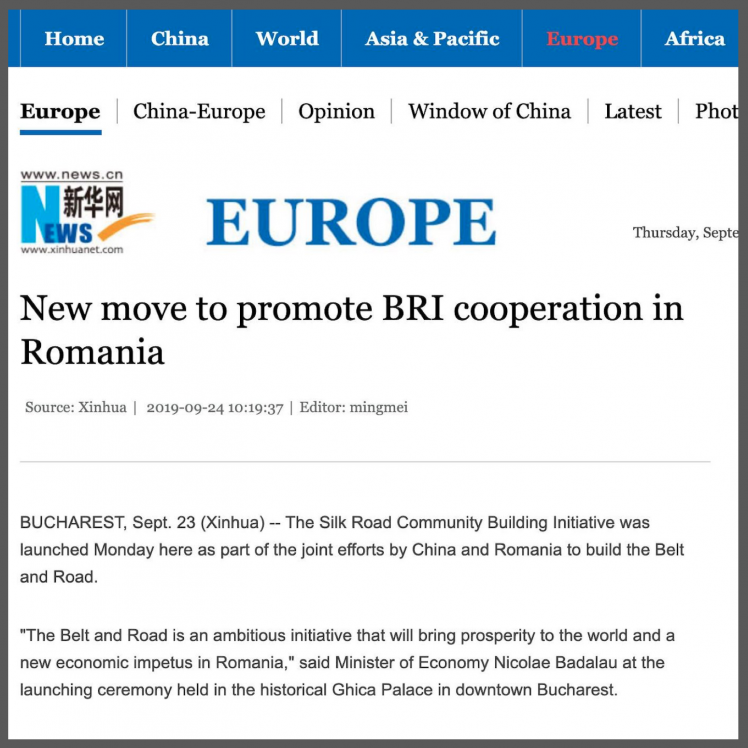
An official Chinese news story in September 2019 talks about a new initiative to promote the Belt and Road Initiative in Romania.
The story that begins our search is a news release from China's official Xinhua News Agency. For those not familiar with Xinhua, this is China's official news agency, a ministry-level institution directly under the government, tasked with reporting news from China and across the globe in Chinese and other languages. Like other state media operated by the Chinese Communist Party (CCP), Xinhua's primary agenda – made clear in policy documents and official speeches, and in its "About Us" introduction – is to serve the interests of the CCP in carrying out what it calls "news and public opinion work," ensuring that media coverage and public opinion are favorable to the leadership.
This particular English-language Xinhua News Agency story informs us that on September 23 China and Romania jointly launched a program called the "Silk Road Community Building Initiative." According to Xinhua the initiative, which comes under the "framework of the Belt and Road Initiative," centers on "cultural and people-to-people exchanges and cooperation in areas concerning people's livelihood."
As in the case of our previous "Guanxi Matters" post, we have an official news story indicating that these are "local" exchanges undertaken by civil society. The initiative, we are told, was "launched by the China NGO Network for International Exchanges (CNIE) at the second Belt and Road Forum for International Cooperation held in Beijing in April." The story quotes Xu Lüping, a representative of CNIE, as saying that she hopes the new initiative will "help enhance bilateral non-governmental exchanges, local livelihood and the foundation for stronger China-Romania friendship."
The talk of "bilateral non-governmental exchanges" suggests the initiative is happening at the local level as a push by civil society. This perception is strengthened by quotes from Romanian sources, including Cornel Lozneanu, executive vice president of the Romania-China Chamber of Commerce and Industry, who apparently told Xinhua that he thinks the new "Silk Road Community Building Initiative" will "pave the way for easier and quicker and more useful cooperation among our organizations."
The talk of "bilateral non-governmental exchanges" suggests the initiative is happening at the local level as a push by civil society.
The sense that this new initiative is sub-national and non-governmental is furthered by Valeriu Tabără, the president of the Academy of Agricultural and Forestry Sciences, a public institution, who is quoted in the Xinhua story as saying that the new initiative "proves that the Belt and Road [Initiative] means more than asphalt roads, it's about humans and their interactions at all levels."
So here we have an ostensible non-governmental exchange called the "Silk Road Community Building Initiative," being undertaken by the "China NGO Network for International Exchanges (CNIE)," coordinating with Romanian organizations.
Time to take a deeper look at the "China NGO Network for International Exchanges."
A quick search for the group in double quotes – instructing the search engine to look only for the full name – brings up an entry from the Union of International Associations listing CNIE as having consultative status at the United Nations Economic and Social Council (ECOSOC). Right away we can see that this Chinese "network" is active on economic and social work at the UN.
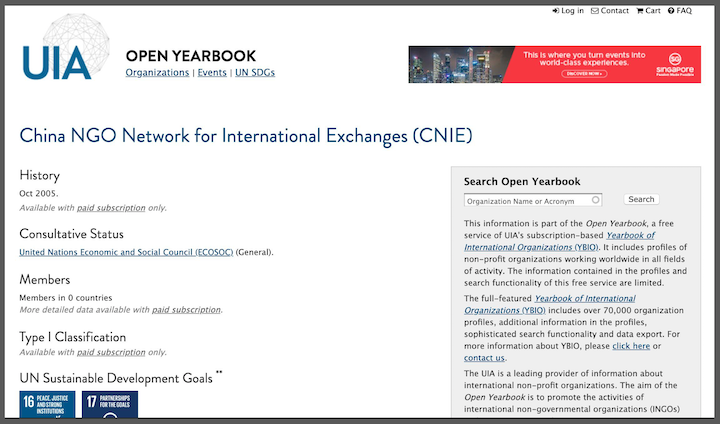
Screenshot from the Union of International Associations website showing CNIE as having consultative status at the United Nations Economic and Social Council (ECOSOC).
Another top result in our initial search provides an introduction to the China NGO Network for International Exchanges. However, there is no indication that the group is anything other than what its name suggests: a network of bona fide civil society groups in China.
We are told that CNIE was founded in 2005 "as a coalition of NGOs," with the goal of promoting "the purposes and principles of the UN Charter." "At present," says the introduction, "CNIE has 31 member organizations, which are all national social organizations with extensive domestic and international influence, active in conducting international exchanges and participating in events organized by international NGOs."
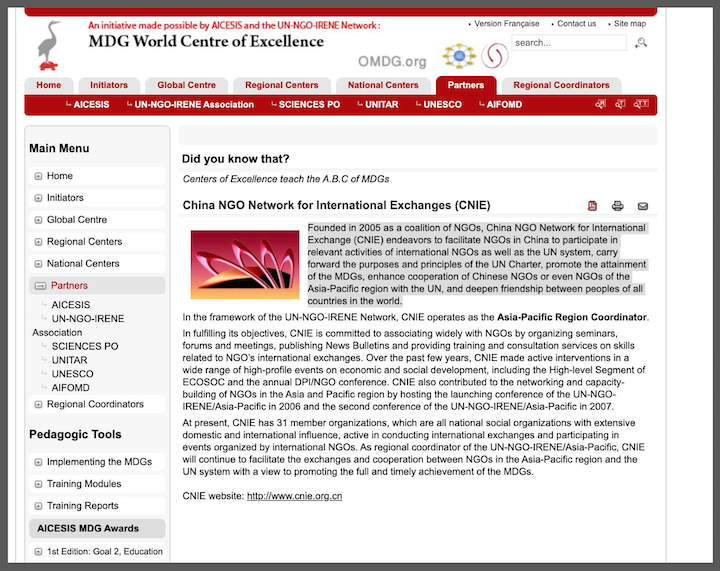
At first glance, then, CNIE does seem to be a civil society organization, and a January 2019 post from China Development Brief (CDB) appearing in our original search also refers to "[c]ivil society organizations such as the China NGO Network for International Exchanges."
But the site link for CNIE at the bottom of the online entry pictured above offers our next lead to follow – noting that the link does not come up anywhere in the first 100 results from our Google search (a common problem).
The link to the official website of the China NGO Network for International Exchanges (CNIE) immediately provides something valuable to our search, a Chinese name for the organization (中国民间组织国际交流促进会). However, a search in quotation marks for the Chinese name of the network does not seem to indicate much else aside from the apparent fact, once again, that this is a super-network of civil society organizations.
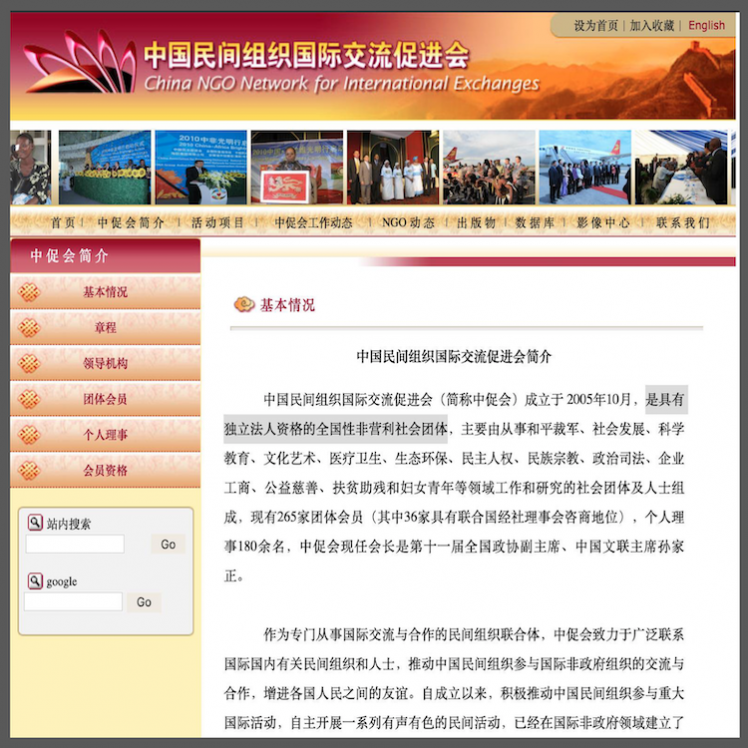
The "About Us" section of the CNIE website tells us that it is a "national non-profit social organization vested with independent legal person status" (是具有独立法人资格的全国性非营利社会团体). It claims 265 non-profit members in China, and it networks with international organizations.
What now?
There is another simple method we can use to try to determine the background of the China NGO Network for International Exchanges." We can conduct a "WhoIs Search" of the domain name "cnie.org.cn" to see who or what organization or body has registered the web address, and even possibly find other associated information such as e-mail addresses and other contacts.
This does not always yield results, as the "registrant" (the person or group operating the site) can in some cases opt to disguise this information. But it can sometimes cut right to the heart of the matter. Researchers might try the "WhoIs" search engine at DomainTools, or at Whois.net, or just try a basic search for "WhoIs Search" to find others who offer the free service.
Always make sure along the way to keep a careful record of the searches you have made, saving screenshots and/or exporting results to PDF. Here is the "WhoIs Search" for cnie.org.cn.
